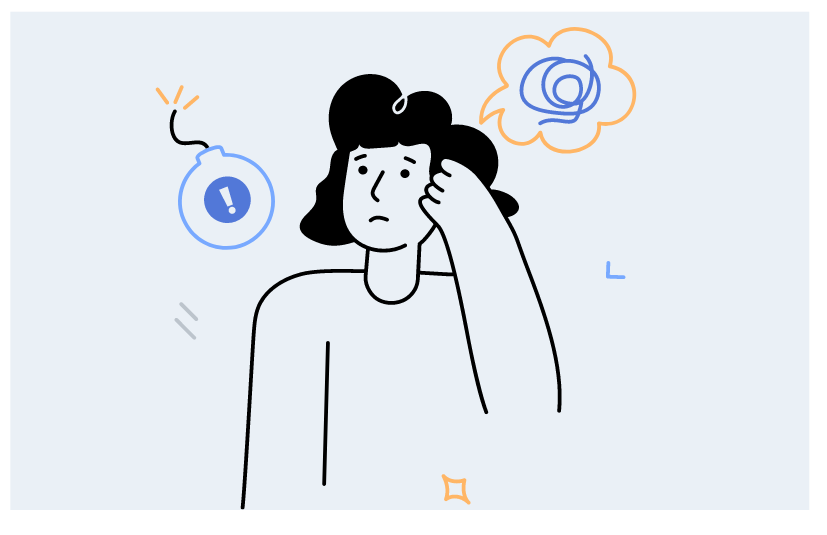Anxiety Triggers
Introduction
Mental health is a complex and multifaceted aspect of our overall well-being. It encompasses our emotional, psychological, and social well-being, affecting how we think, feel, and act. Understanding mental health triggers is crucial in identifying the root causes of anxiety.
Triggers can be categorized into various types, including external factors, internal factors, and environmental factors. By recognizing these triggers, we can take proactive steps to manage and prevent anxiety.

Types of Mental Health Triggers
To truly conquer anxiety, it is crucial to have a deep understanding of the triggers that contribute to its onset. Mental health triggers are factors or situations that can lead to increased anxiety symptoms.
These triggers can vary from person to person, as everyone’s experiences and sensitivities are unique. Some common mental health triggers include stress, trauma, certain medications, substance abuse, and underlying mental health conditions such as depression or obsessive-compulsive disorder.
| Type of Trigger | Description |
|---|---|
| External Factors | Triggers originating from outside influences, such as stress at work, relationship problems, financial difficulties, or traumatic events. |
| Internal Factors | Triggers that arise from within oneself, such as negative self-talk, low self-esteem, unrealistic expectations, or perfectionism. |
| Environmental Factors | Triggers associated with the physical environment, such as noise, crowded spaces, pollution, or lack of sunlight. |
The Link Between Mental Health and Anxiety
Anxiety is a common mental health condition that affects millions of individuals worldwide. It is characterized by intense feelings of fear, worry, and unease. Mental health triggers play a pivotal role in the development and exacerbation of anxiety disorders.
When triggered, individuals with anxiety may experience heightened levels of stress and anxiety symptoms. Understanding the connection between mental health and anxiety is crucial in effectively managing and treating this condition.
Common Mental Health Triggers for Anxiety
| Trigger | Description |
|---|---|
| Work-related stress | High-pressure work environments, long hours, demanding deadlines, and job insecurity can significantly impact an individual’s anxiety levels. |
| Relationship problems | Difficulties in personal relationships, such as conflicts, breakups, or divorce, can trigger anxiety and emotional distress. |
| Financial difficulties | Financial instability, debt, or economic hardships can lead to chronic stress and anxiety. |
| Traumatic events | Experiencing or witnessing traumatic events, such as accidents, violence, or natural disasters, can trigger anxiety disorders. |
Identifying Personal Mental Health Triggers
Identifying personal mental health triggers is a crucial step in managing anxiety effectively. Each individual may have unique triggers that can vary in intensity and frequency. Self-reflection and self-awareness play key roles in uncovering these triggers.
It is essential to pay attention to our thoughts, emotions, and physical sensations to recognize patterns and triggers that provoke anxiety. Journaling, therapy, and mindfulness practices can aid in this process, allowing us to gain deeper insights into our triggers and develop coping strategies.
The Impact of Environmental Triggers on Anxiety
Environmental factors can significantly impact our mental health and trigger anxiety. Noise pollution, overcrowded spaces, air pollution, and lack of natural light are examples of environmental triggers that can contribute to anxiety disorders.

These triggers can heighten stress levels and make individuals more susceptible to anxiety symptoms. Creating a calm and nurturing environment can help to alleviate anxiety triggers.
Strategies such as decluttering, incorporating natural elements, and establishing a consistent sleep routine can positively impact mental well-being.
Managing and Preventing Mental Health Triggers
Once we have identified our mental health triggers, it is crucial to develop strategies to manage and prevent them. This may involve making lifestyle changes, setting boundaries, seeking support, and practicing self-care.
Engaging in regular exercise, practicing relaxation techniques, maintaining a healthy diet, and getting enough sleep are effective ways to manage anxiety triggers.
Additionally, building a strong support network, including friends, family, or support groups, can provide invaluable assistance in navigating the challenges of anxiety triggers.
Seeking Professional Help for Anxiety Triggers
While self-management strategies can be helpful, seeking professional help is essential for individuals struggling with anxiety triggers. Mental health professionals, such as therapists, psychologists, or psychiatrists, can provide specialized guidance and support.
They can help individuals explore the underlying causes of their anxiety, develop personalized coping mechanisms, and provide evidence-based treatments if necessary. Remember, reaching out for professional help is a sign of strength and a step towards reclaiming control over your mental health.
Support Systems for Individuals with Anxiety Triggers
Building a strong support system is instrumental in managing anxiety triggers. Friends, family, and support groups can offer understanding, empathy, and encouragement during difficult times. Sharing experiences, seeking advice, or simply having someone to talk to can provide immense relief.
Online communities, helplines, and support groups specifically designed for individuals with anxiety can be valuable resources. Remember, you are not alone in your journey, and there are people who genuinely care and want to support you.

Conclusion
Identifying mental health triggers for anxiety is a vital step in breaking the chains that hold us back. By understanding the various types of triggers and their impact, we can take proactive steps to manage and prevent anxiety.
Whether it’s through self-reflection, seeking professional help, or building support systems, there are numerous strategies available to help us navigate the challenges of anxiety triggers. Remember, you have the strength and resilience to overcome anxiety and lead a fulfilling life. Break free from the chains and embrace a future filled with hope and well-being.
Related post
References
Important. If you or someone you know is struggling with anxiety or mental health challenges, it is essential to seek support. Reach out to a mental health professional or confide in a trusted friend or family member. Remember, you do not have to face this alone.

